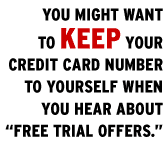| |||||||||

Bogus buyers' clubs infiltrating the Web
 Consumer-protection organizations are warning that bogus "buyers' clubs,"
common in the telemarketing world, are making their way to the Internet. Consumer-protection organizations are warning that bogus "buyers' clubs,"
common in the telemarketing world, are making their way to the Internet.
Guarding against unexpected charges from buyers' clubs is one of the little joys of credit card ownership. Here's how it works: After you order a low-priced product using a credit card, you later find a separate charge on your billing statement enrolling you in a "discount club." "Consumers report being charged for memberships despite the fact that they only wanted the merchandise and didn't want to join the club," according to a report from the National Consumers League, a 101-year-old advocacy group. Questionable buyers' clubs seem to be migrating from telemarketing to cyberspace, experts say. "We've had a few complaints about buyers' clubs on the Internet," Holly Anderson, the league's director of communications, said in an interview. However, Anderson would not name specific Internet companies that have generated the recent complaints. "We don't reveal them unless there's been some law enforcement action," she said. An ongoing investigation might be harmed, she noted, if the targets knew they were being investigated.
But it isn't too hard to spot the signs that something is amiss--if you
know what to look for. One danger signal arises when you're purchasing a product, but text on a Web page or comments by a toll-free number operator suggest that you are also eligible for a "free trial" of some other service. One of the biggest law-enforcement cases brought against an Internet company recently for such a program involved Damark International. The Minnesota-based company operates a retail Web site and is known for mailing millions of catalogs offering discounted electronics and other products. Last December, Minnesota Attorney General Mike Hatch announced that Damark had agreed to pay $75,000 in penalties because of disputed credit card charges that enrolled consumers into its buyers' clubs. The attorney general said at the time that Damark had used a deceptive "free trial offer." After a telemarketer offered a "risk free" trial, consumers' credit cards were charged unless they called to cancel within 30 days. The card was charged again for a "renewal" fee every year thereafter. Under the settlement, Damark agreed to tape-record every call and send members a postcard at least one month before their "renewal." In addition to the $75,000 penalty, "From now on, customers will get a double refund if Damark charges the consumer's card without knowing consent," Hatch said in a statement. So, you might ask, how's the company doing a year later? Gangbusters, apparently. Damark now concentrates on membership clubs and online services. The company phased out its mass-mailing catalog in June, after its net revenue from catalogs plunged 25 percent in 1999. But its net revenue from memberships climbed more than 50 percent, according to a report in Catalog Age, a trade publication. A visit to Damark's Web site shows why: An advertisement on the home page markets a $100 gasoline rebate. Clicking on this ad and then clicking on a similar one on the next page takes you to an order page with the following message: "Damark Rewards Trial Offer. Enrollment Fee: $1.99." The page then requests a credit card number. You might assume this is to collect the $1.99 enrollment fee. If you scroll manually through a small text box at the bottom of the page, however, you'll find the following in the "Terms and Conditions" fine print: "If you choose not to continue beyond the 30-day trial period...for your convenience, the annual fee of only $99.99 will be billed to your credit card. To ensure continuous service, your membership will be automatically renewed each year and the then-current annual fee charged to your credit card unless you call us to cancel prior to that time." For your convenience, you might want to keep your credit number to yourself when you hear about "free trial offers." Consumer advocate Brian Livingston appears at CNET News.com every Friday. Do you know of a problem affecting consumers? Send info to tips@BrianLivingston.com. He'll send you a book of high-tech secrets free if you're the first to submit a tip he prints. biography |
|
|||||||||||||||||||||||
|
Send us news tips | Contact Us | Corrections | Privacy Policy |
|

